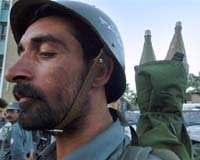 |
Helsinki, Finland (UPI) Feb 3, 2009 The U.S. military recently announced that the elders of the Shinwari tribe, which comprises 600,000 people in Nangarhar province and spans the Afghan-Pakistan border, signed an agreement to keep the Taliban out of their area. The United States agreed to pay $1 million into a Shinwaru tribal fund and $200,000 for a jobs program. The tribal elders admitted that the pact grew as much out of frustration with the Afghan central government as from hostility toward the Taliban. U.S. frustration with the present Afghan central government is no secret. In November, Karl Eikenberry, the U.S. ambassador to Afghanistan, wrote in a now-declassified cable to Secretary of State Hillary Clinton: "President (Hamid) Karzai is not an adequate strategic partner. The proposed counterinsurgency strategy assumes an Afghan political leadership that is both able to take responsibility and to exert sovereignty in the furtherance of our goal -- a secure, peaceful, minimally self-sufficient Afghanistan hardened against transnational terrorist groups. Yet Karzai continues to shun responsibility for any sovereign burden, whether defense, governance or development. He and much of his circle do not want the U.S. to leave and are only too happy to see us invest further." Field Manual 3-24 "Counterinsurgency" describes its primary objective as "to foster development of effective governance by a legitimate government." Eikenberry states, "Beyond Karzai himself, there is no political ruling class that provides an overarching national identity that transcends local affiliations and provides reliable partnership." If the current Afghan central government is not an adequate partner, then just what does a legitimate government in Afghanistan look like that could fulfill counterinsurgency's primary objective? The Shinwaru may be unique among Afghan tribes because they maintained a strong traditional tribal hierarchical structure, have a well-organized militia and a history of defending itself against intruders. The agreement with the Shinwaru may be the first step in effectively establishing anti-Taliban governance in Afghanistan. It will be neither easy nor quick. As a result of the Soviet invasion, years of civil war and the brutality of Taliban rule, many of the traditional tribal structures and cultures were destroyed. It may, however, be the last best chance of preventing the Taliban rule over all of Afghanistan, which will inevitably lead to destabilization of the entire region. Through a decentralized and bottom-up approach duplicating and building upon the successful Shinwaru approach with other tribes an anti-Taliban confederation, not fettered by central government incompetence, could be created. The Afghan central government will never make a significant contribution to peace and unity unless it can stop its factional infighting, reduce rampant corruption and demonstrate that it can provide security, administer justice and deliver improvements in the lives of ordinary Afghans. Using the Shinwaru, local, tribal-based method will likely require fewer U.S. troops, cost less and have a more immediate impact than our customary policy of working exclusively through the Afghan central government and growing and training the Afghan army and police from the top-down. The most effective means to provide the local populace with security and the rule of law is rooted in the Afghan tribal identity and traditions. By supplementing the Shinwaru approach with coalition infantry and air support as appropriate, the result will likely be a more effective means of executing all the elements of a successful counterinsurgency strategy for Afghanistan. It might also provide a sensible path to a successful exit strategy. (Lawrence Sellin, Ph.D., is a colonel in the U.S. Army Reserve and a veteran of the conflicts in Afghanistan and Iraq . The views expressed are his own and do not necessarily reflect those of the U.S. Army or government.) (United Press International's "Outside View" commentaries are written by outside contributors who specialize in a variety of important issues. The views expressed do not necessarily reflect those of United Press International. In the interests of creating an open forum, original submissions are invited.)
Share This Article With Planet Earth
Related Links News From Across The Stans
 NATO seeks to redress Afghan police shortfall
NATO seeks to redress Afghan police shortfallBrussels (AFP) Feb 3, 2010 NATO defence ministers gather in Istanbul from Thursday to try to drum up thousands of trainers to build the Afghan security forces, and fill a gaping shortfall in police expertise. Nations in the NATO-led International Security Assistance Force (ISAF) have now amassed around 40,000 extra troops and have begun flooding them into strife-torn Afghanistan as part of a new counter-insurgency str ... read more |
|
| The content herein, unless otherwise known to be public domain, are Copyright 1995-2010 - SpaceDaily. AFP and UPI Wire Stories are copyright Agence France-Presse and United Press International. ESA Portal Reports are copyright European Space Agency. All NASA sourced material is public domain. Additional copyrights may apply in whole or part to other bona fide parties. Advertising does not imply endorsement,agreement or approval of any opinions, statements or information provided by SpaceDaily on any Web page published or hosted by SpaceDaily. Privacy Statement |